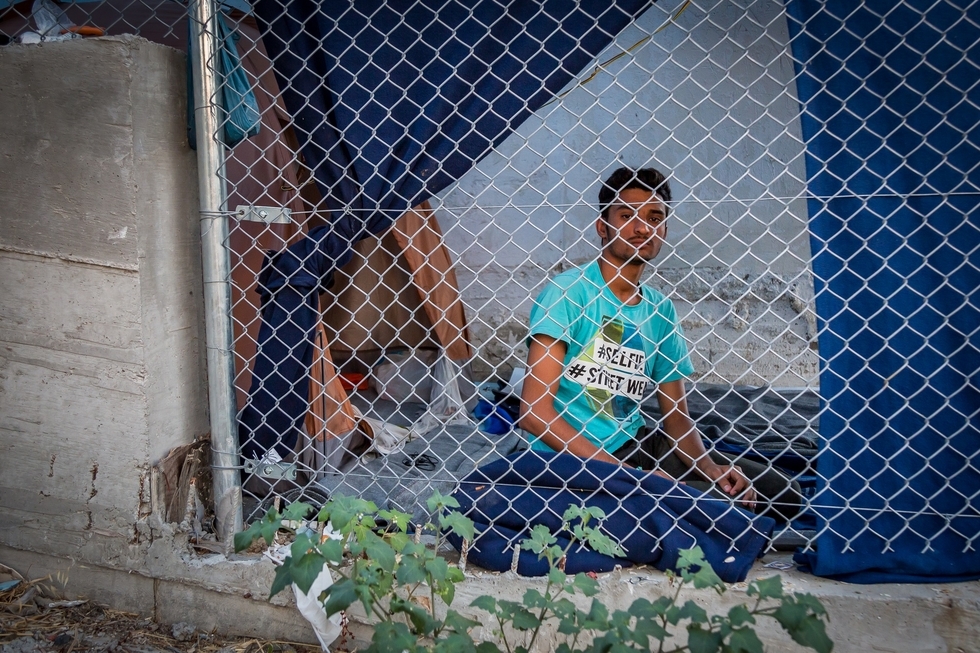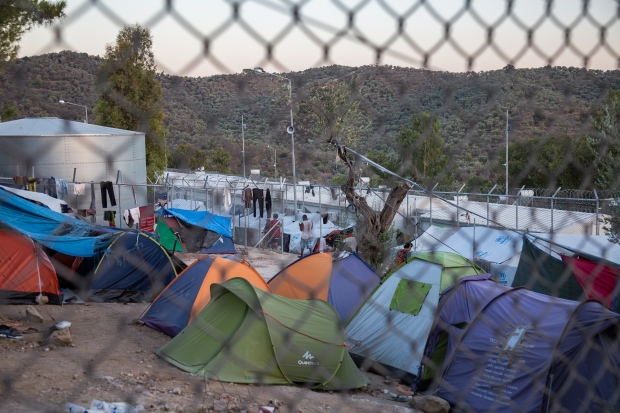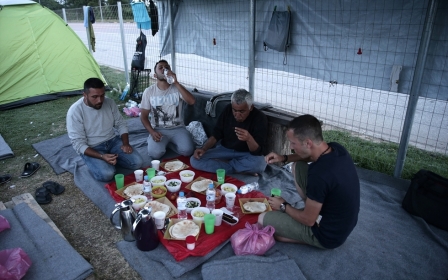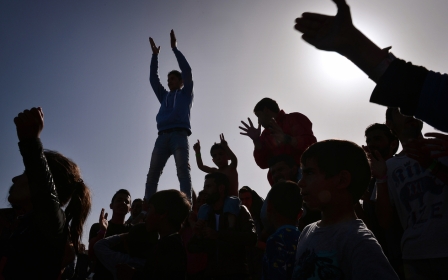Refugee arrivals to Greece surge as EU/Turkey deal hangs in balance

LESBOS, Greece – It’s an open secret in the Moria refugee "hot spot" on the island of Lesbos that the facility, which is supposed to be a closed centre, is far from secure.
Despite being designed to detain asylum seekers, a practice which has received severe criticism from human rights organisations, the facility now has approximately six separate holes in the fence and inhabitants can, if they wish, slip through the gaps and make the one-and-a-half hour walk into the island’s main town of Mitilini.
But it’s no longer the camp itself that has become a prison for 4,000 mostly Syrian and Iraqi refugees, but the entire island of Lesbos. Greek authorities are now obliged to allow those who have been in the camp for longer than 25 days free movement, but not until they have been registered and issued with a small book - or harti as the refugees call it, using the Greek word for "paper" - which in red ink bears a stamp that indicates they are forbidden from leaving the island.
That does not stop many from trying. Many of Moria’s residents leave the camp each evening, travel to the nearby port and attempt to sneak aboard ferries to Athens. Others pay smugglers up to 2,000 euros (about $2,250) for forged documents or passports.
Arrival numbers rising
A recent increase in refugees arriving on the already overcrowded Greek islands has caused concern for EU leaders and the Greek government. There are fears that Turkey could withdraw from the 20 March EU/Turkey refugee deal, in which Turkey promised to take back refugees who had left its shores after 20 March in return for a number of pledges including visa-free travel for Turks in the EU.
Ankara says the EU has failed to honour that commitment.
Rami Alam, from Mansoura in Egypt, is one of Moria’s newest arrivals having landed on Lesbos on 16 August. He told MEE he had succeeded after three previous attempts, twice having been caught by Turkish authorities and once having found that the raft he was on was sinking, which speaks of the lengths many refugees and migrants will go to in order to reach Europe.
Moustafa Aboulela, from Damascus, also made the crossing on 16 August, but says he did not know before coming about the Moria camp or that he would be held there.
“This place is very bad. If I knew about it before coming I would have stayed. We sleep on the floor in tents because the camp is full.”
According to the UNHCR 1,577 migrants landed on the Greek Aegean Islands in the first 17 days of August. That figure compares to 1,855 arrivals for the whole of July. According to the Greek ministry of internal Affairs, 261 arrivals landed between Thursday and Friday morning. That is almost double the average daily arrivals of previous days.
The majority of the recent arrivals have landed on Lesbos after crossing the 12km strait between Turkey and the island’s northern coast. Eric Kempson, a British resident of Skala Sikamineas, the village on the northern shore of Lesbos which receives the brunt of the arrivals, told MEE there has been a noticeable increase.
“Today we had two boats in with over 130 people on, one with 66 on one and 73 on another. Every day we’re getting two, three boats coming in on the island” he said.
The numbers constitute a small increase and little compared to the 1,600 daily arrivals at the height of the crisis in July last year, but the spike has been enough to cause the Greek government alarm and to develop contingency plans should the numbers continue to rise.
The country's prime minister, Alexis Tsipras, cut short his holiday earlier this month to meet his migration minister, Yiannis Mouzalas, to discuss the issue.
Athens has expressed concern at the suggestions of Turkish officials that the deal could be suspended, but have insisted that for now the deal is working.
“So far Turkey has kept to the agreement and we are making every effort so the deal is upheld,” Mouzalas told Greek Skai TV, but added that Greece would be “severely tested if the agreement collapses.”
“If the flows start again, no country would be able to cope with those kind of numbers. We are fearful and we are preparing. We have the first and second steps that we would take, in place.”
Earlier this week, Turkish Foreign Minister Mevlut Cavusoglu suggested Turkey could terminate the deal if its citizens do not receive visa free travel to the EU by October, a condition it considers to be part of the EU’s side of the agreement.
Asked by the German newspaper Bild whether hundreds of thousands of refugees in Turkey would head to Europe if the EU did not grant Turks visa freedom from October, Cavusoglu said "I don't want to talk about the worst case scenario - talks with the EU are continuing but it's clear that we either apply all treaties at the same time or we put them all aside."
Refugees find respite in volunteer run support centre
In one side street of the capital town of Mitilini, asylum seekers - some of whom have been stuck on the island for five months - can find a place to occupy their time and forget, at least for the time being, the difficulties facing them.
The Mosaic Support Centre, located in a grand 19th century house and run jointly by asylum seekers and volunteers, offers a large range of activities and classes, as volunteer Chloe Haralambous explains.
“We have English classes, Greek classes, Arabic classes, a day care centre for children whose parents are taking classes, a life-jacket up-cycling workshop where refugees make bags out of discarded life vests, a jewellery workshop, textiles workshop, swimming classes, sports classes, legal workshops; that’s about it.”
“It’s one of the very few places where refugees can go and not feel like refugees. Partly because it’s in the centre of town, it’s a beautiful place – the house was built in 1868 – and it gives them a sense of normality.”
Isa, a Palestinian-Syrian, who declined to give his surname in order to protect his family in Damascus, now works 5 days a week as a volunteer translator in the centre.
“We were refugees in Syria too because my family left Palestine before I was born, now I am a refugee in Greece.”
Isa says that even though he was born in Damascus, he has neither an official status as a Syrian, or a Palestinian, complicating his asylum claim in Europe.
“The UN says I am a stateless person, so when I spoke with the Greek asylum service they didn’t know what to do with me. That was about five months ago. I haven’t heard from them since.”
“I’d rather be able to leave this island, but as long as I am here this [support centre] makes things a bit better.”
New MEE newsletter: Jerusalem Dispatch
Sign up to get the latest insights and analysis on Israel-Palestine, alongside Turkey Unpacked and other MEE newsletters
Middle East Eye delivers independent and unrivalled coverage and analysis of the Middle East, North Africa and beyond. To learn more about republishing this content and the associated fees, please fill out this form. More about MEE can be found here.





